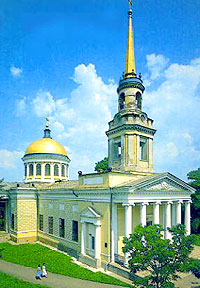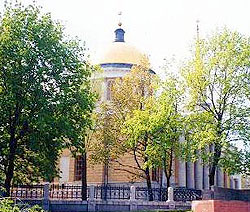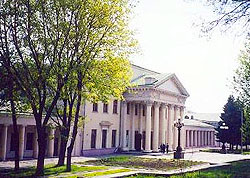|
Yekaterinoslav

"The City of Yekaterinoslav - entirely the creation of Prince Grigoriy Potyomkin" -
wrote the famous Ukrainian historian Dmytro Yavornitskyi.
And the construction plans were far ahead of their time...
In the 1770s the Russian Empire bacame anxious with the problem
of Turkish domination in Asia Minor. The numerous Turkish fortresses on the Black Sea coast and Dnieper River banks
prevented border crossings to the empire to the south. The last Slavic fortified territories were Cossacks' forts - Zaporiz'ka
Sich. Cossack AND Russian armies participated in the war with Turkey. In 1774 Prince Grigoriy Potyomkin (1739-91)
was nominated as governor of Novorossiysk gubernia (region). In that year the Turkish-Russian war was settled. Now the
Cossack army as a rallied military force was not so necessary for the Empire. The fertile land of Zaporizhya had attracted
Russian landowners for a long time and the new plan of Katherine II was the gradual destruction of the Cossacks' state.
In 1775 Sich was destroyed. Division of the Zaporizhian lands and its gradual settling by foreigners of all nations required
construction of new cities and settlements. Then began the realisations of the large projects in glory to Katherine the Great:
construction of the cities of Kherson, Nikolaev and Yekaterinoslav.
The first site of the new city in 1776 was chosen rather
unsuccessfully: at the confluence of Kil'chen' River into the Samara River in the area of Loshakivka. In 1782 the city's
population was 2194 inhabitants, however the next year it was ordered the site be transferred because of the unfitness
of the place for construction and residing. Spring waters transformed the city into a bog.
 Yekaterinoslav-2 was based in 1783 in the Zaporizhian village of Polovytsia (founded approximately at the end of 1760s),
between the settlements of Old and New Kodaki. Polovitsia was settled west of the main section of the city
(between Ozyorka and the present central part of the city). After some years it was absorbed by the growing city limits.
Yekaterinoslav-2 was based in 1783 in the Zaporizhian village of Polovytsia (founded approximately at the end of 1760s),
between the settlements of Old and New Kodaki. Polovitsia was settled west of the main section of the city
(between Ozyorka and the present central part of the city). After some years it was absorbed by the growing city limits.
The construction plans of the city were huge: 30 verstas (Russian length unit 1 versta=~ 1 km) in length, 25 in width, up to
the Mokra Sura River. The main structures would settle down on the hill. At the corona of it all would be the
Preobrazhenskiy Cathedral the size to be "unique in the whole world") In addition to the Cathedral there were
construction plans to build a huge "magnificent university" (but it was not built).
The streets of the new city were to be direct and wide. On Monastyrskyi Island there was supposed to be a botanical garden.
 Many of these unique and unusual plans were lost in Russian red tape, defective workmanship and stealing.
Structures including Potyomkin Palace were under construction very slowly. The construction site was
bought from retired Cossack yesaul (colonel) Lazar' Globa, who possessed a lot of lands up to the borders of the new
city (L. Globa is known for his gardens which partly exist now).
Prospering larceny and a change of authority (both Prince Potyomkin and Katherine II had died and the receiver Pavel
the First hated favorite creations of his mother) caused all construction to stop by the end of the century. The plans were
reconsidered, the size of the Cathedral was reduced (it was completed only in 1835), parts of buildings were left unfinished.
Many of these unique and unusual plans were lost in Russian red tape, defective workmanship and stealing.
Structures including Potyomkin Palace were under construction very slowly. The construction site was
bought from retired Cossack yesaul (colonel) Lazar' Globa, who possessed a lot of lands up to the borders of the new
city (L. Globa is known for his gardens which partly exist now).
Prospering larceny and a change of authority (both Prince Potyomkin and Katherine II had died and the receiver Pavel
the First hated favorite creations of his mother) caused all construction to stop by the end of the century. The plans were
reconsidered, the size of the Cathedral was reduced (it was completed only in 1835), parts of buildings were left unfinished.
From 1797 to 1802 the city was called Novorossiysk. It eventually decayed and became a silent village. The great plans
were in the past. From them there was only the spirit of what could have been greatness. So it was until 1870, when the city
became alive again....
| Dnepropetrovsk Romance Tour Details |
| |
|
|
|
| Romance Tours |
 Russian Women Tours Russian Women Tours
| | |

|
Russian Dream Girls
7320 N Dreamy Draw Drive
Phoenix, Arizona 85020
(602) 553-8178
FAX (602) 468-1119
Contact Us
|
|
THIS PROGRAM IS THE SOLE PROPERTY OF RUSSIAN DREAM GIRLS AND MAY NOT BE COPIED IN ANY WAY OR FORM WITHOUT EXPRESS PERMISSION FROM RUSSIAN DREAM GIRLS.
© COPYRIGHT 1996-2025 - ALL RIGHTS RESERVED.
|
|
|